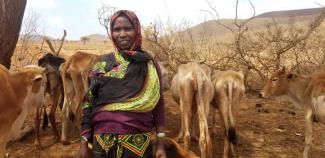2030 Agenda
Sustainable Development Goals "almost unachievable"

The 17 Sustainable Development Goals (SDGs) established by the UN in 2015 are “almost unachievable” by the target date of 2030 according to Mathias Mogge, Chief Executive Officer of Welthungerhilfe, the international NGO based in Germany. After decades of major progress in the fight against hunger and poverty, the number of people affected by acute hunger has risen steadily since 2018, as documented in the “Global Report on Food Crises 2023”, a joint publication by, among others, the UN and the EU.
According to the report, 258 million people in 58 countries suffered from acute hunger last year. The number went up from 193 million in 2021. Today people in seven countries are on the brink of dying from starvation.
Germany’s Federal Foreign Office reports that the number of people who are so poor that they depend on humanitarian aid will rise to 339 million this year, an increase of about 100 million compared to last year. The number of displaced persons and refugees around the world has also increased dramatically. It recently reached the 110 million mark, according to the UN Refugee Agency (UNHCR).
“I am very concerned to see that we once again have experienced setbacks in the fight against poverty and hunger,” Mogge said at the presentation of “Kompass – Zur Wirklichkeit der deutschen Entwicklungspolitik” (“Compass – On the reality of German development policy”). The NGOs Welthungerhilfe and terre des hommes (tdh) have been publishing this report annually for 30 years. According to “Kompass”, the main reasons for these setbacks are the Covid-19 pandemic, the war in Ukraine and the rise in extreme weather, which has jeopardised the food supply in many countries.
Welthungerhilfe and tdh are pleased that Germany’s official development assistance (ODA) has been at 0.7 % of gross national income (GNI) for three years, as requested by the UN. Last year, Germany’s ODA reached 0.83 %, the largest share of GNI to date. In numbers, that is € 33.3 billion in ODA and an increase of 13.5 % compared to 2021. Part of this increase can be attributed to the fact that spending on refugees living in Germany rose by 77 % during this period. Most of the refugees came from Ukraine.
NGOs are urging that German ODA be kept at all costs from falling back under the level of 0.7 % of GNI (gross national income). They are alarmed because the German government’s 2024 budget envisages drastic cuts for ODA. “That would be a catastrophic signal and a big step backwards”, emphasises Joshua Hofert from terre des hommes. According to him, Germany cannot give up its leading role as the world’s second largest donor, based on the amount spent. The largest net contributor is the US.
The organisations believe that more ODA must reach the least developed countries, most of which are located in sub-Saharan Africa. Even though these countries are most impacted by the climate crisis and conflicts, German ODA has not increased in the region for years.
Mogge praised the current “feminist development policy” being pursued by Germany’s Federal Ministry for Economic Cooperation and Development (BMZ). The BMZ is sending a strong signal, he argues. Nevertheless, he believes that human rights and women’s rights should be advanced in difficult political climates as well.
One of the most challenging countries is Afghanistan, where women are systematically repressed since the radical-Islamist Taliban seized power. Both Welthungerhilfe and terre des hommes still operate in Afghanistan and are advocating for women’s rights. However, they say they are currently succeeding only in negotiations with “local authorities and on very narrow issues”. The experts don’t foresee that the situation will improve any time soon.
Link
Global Report on Food Crises 2023:
https://www.fsinplatform.org/global-report-food-crises-2023
Sabine Balk is an editor at the Frankfurter Allgemeine Zeitung and a freelance contributor to D+C/E+Z.
euz.editor@dandc.eu














